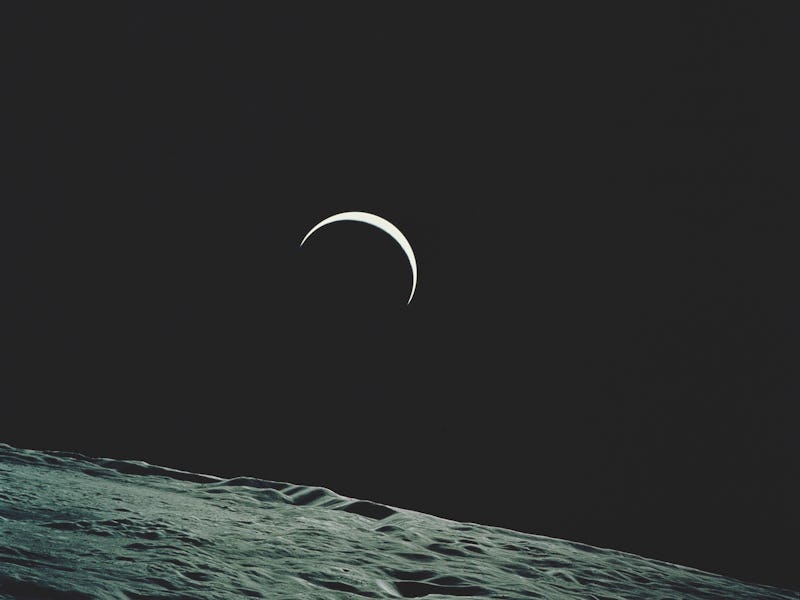Artemis Moon Missions Are Still a Priority in NASA's Latest Budget
NASA outlined its upcoming space priorities to members of Congress on Thursday.

Members of Congress have concerns that a new bill, passed on Wednesday by the House of Representatives, could stymie NASA’s Artemis program and our “space race” with China.
On Thursday, NASA Administrator Bill Nelson testified in front of the House Committee on Science, Space, and Technology to answer questions as the oversight body prepared to review the Biden Administration’s NASA budget request for 2024. (As USA.gov explains, federal budgets are planned a year before they go into effect, are submitted to the White House for approval, and the President then sends the requests to Congress for approval.)
The optical navigation camera mounted on the Artemis I Orion spacecraft captured these views of the Moon’s surface.
If the NASA budget is approved, the space agency would receive a 7 percent increase from last year’s enacted budget, with $27.2 billion for the year 2024 to fund its science portfolio. This includes work on the Artemis missions anticipated to take place in the next several years, the Mars Sample Return mission, where future spacecraft would ferry Red Planet samples in titanium tubes back to Earth, the management of the International Space Station (ISS) until it is deorbited around the year 2030, running spacecraft to monitor the climate crisis, and more.
But fresh on the minds of committee members is the Republican-led “Limit, Save, Grow Act of 2023,” which the House of Representatives passed on Wednesday by a two-vote margin with no Democratic support. The bill’s premise is to address the debt ceiling, though critics say the measures are draconian. Civilian agencies like NASA might take budget cuts of more than 20 percent, members of Congress said during Thursday’s hearing. They asked Nelson what impact those cuts would have on the space contracts in their districts and why the U.S. needs to be in a competitive mode in space.
“We cannot cede our leadership to China when it comes to space,” committee Ranking Member Congresswoman Zoe Lofgren (D-CA) said at the beginning of Thursday’s hearing. When she asked Nelson what would happen to “American leadership in space” if the bill succeeded in locking in years-long spending limits — proposed to last until 2033 — Nelson said it would be a “disaster.”
He cited China’s “extraordinary” spacefaring successes in the last decade, like its new low-Earth orbit space station and the nation’s “very clear” objective to place a crew on the Moon.
This screen image from Feb. 9, 2023 shows Shenzhou-15 taikonaut (Chinese astronaut) Fei Junlong returning to China’s space station lab module Wentian after finishing a space walk.
In a reply to concerns Congressman Bill Posey (R-FL) raised about China, Nelson described the appeal of the Artemis III target landing site at the lunar south pole. The dark cavities within that region’s craters may have ice, a lucrative material for astronaut consumption as well as a source of energy. But to land successfully on this rugged terrain, NASA needs investment funds. Nelson spoke about the existing SpaceX contract for an Artemis III lander, briefly mentioning its request for proposals for a second lunar lander. Funding limits could push these missions into the future, and Nelson suggested that if China got to the lunar south pole first, they could claim it as their territory.
Nelson said the next Artemis mission, the crewed Artemis II flight around the Moon and back, is on schedule for November 2024. NASA expects Artemis III to take place a year later, in 2025 — this will be the momentous first lunar landing since Apollo.
Artemis IV is also in the works, though Nelson said schedule delays at their contractor Boeing will delay this mission — likely from 2027 to 2028 — which would deliver a portion of the lunar space station Gateway. To accommodate that hefty cargo, NASA will need funding this decade to develop a bigger version of the Space Launch System (SLS) rocket, Nelson added.
An illustration showing a full Gateway configuration orbiting the Moon, and a smaller crewed Orion approaching it.
He received several questions about Russia and emphasized that Russia and the United States maintain a good working relationship in space. When addressing a question from Congressman Randy Weber (R-TX) about Russia and China, Nelson said that Russia has been the better partner in space. For instance, he relayed that NASA trusts the Russian space agency Roscosmos’ assessment of the recent Russian Soyuz crew capsule leak following an inquiry from Congressman Brian Babin (R-TX). In December 2022, liquid coolant sprayed out from the space vehicle when it was docked at the ISS. The incident, which Russia says was the result of a micrometeoroid hit, left three crew members stranded on the ISS. The replacement Russian Soyuz has already reached the orbiting laboratory and will bring the trio back to Earth later this year.
NASA also wants the ability to request funding for contingencies. For example, in the event that the war with Ukraine should sever the spaceflight relationship between the U.S. and Russia, NASA says it would want the funding to deorbit the ISS solo, if necessary. The plan to bring down the iconic facility is currently expected to be a collaboration between NASA and Roscosmos.
It’s possible that the bill will only serve as a political tool and talking point and not be enacted into law. Democrats are by and large opposed to the bill, and their political party currently has a majority in the Senate, where the bill would go next.
This article was originally published on